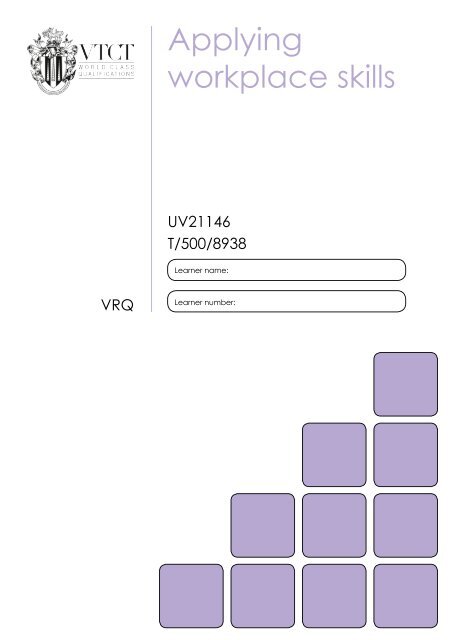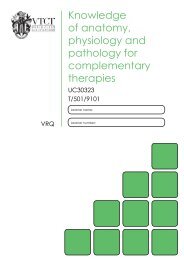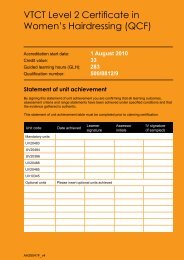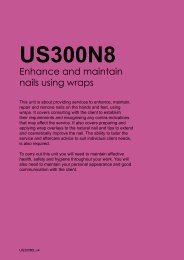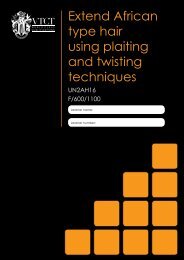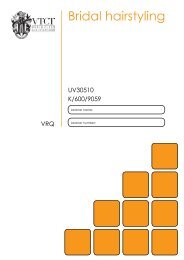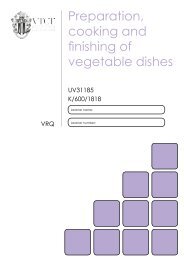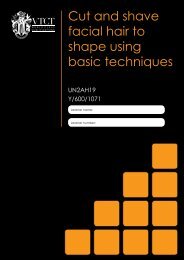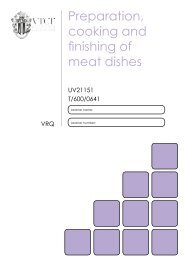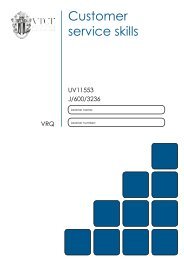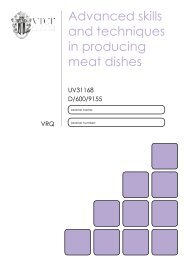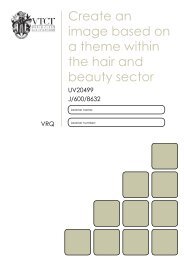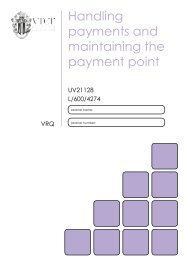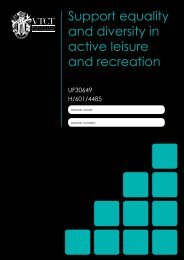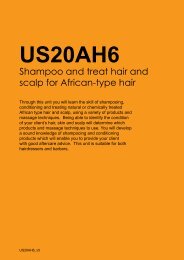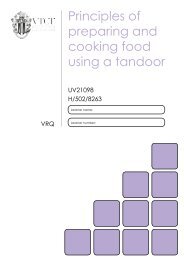Applying workplace skills - VTCT
Applying workplace skills - VTCT
Applying workplace skills - VTCT
You also want an ePaper? Increase the reach of your titles
YUMPU automatically turns print PDFs into web optimized ePapers that Google loves.
VRQ<br />
<strong>Applying</strong><br />
<strong>workplace</strong> <strong>skills</strong><br />
UV21146<br />
T/500/8938<br />
Learner name:<br />
Learner number:
Statement of unit achievement<br />
By signing this statement of unit achievement you are confirming that all learning outcomes, assessment<br />
criteria and range statements have been achieved under specified conditions and that the evidence<br />
gathered is authentic.<br />
This statement of unit achievement table must be completed prior to claiming certification.<br />
Unit code Date achieved Learner signature<br />
Assessor tracking table<br />
<strong>VTCT</strong> is the specialist awarding body for the Hairdressing, Beauty Therapy, Complementary Therapy,<br />
Hospitality and Catering and Sport and Active Leisure sectors, with over 45 years of experience.<br />
<strong>VTCT</strong> is an awarding body regulated by national organisations including Ofqual, SQA, DfES and CCEA.<br />
<strong>VTCT</strong> is a registered charity investing in education and <strong>skills</strong> but also giving to good causes in the area<br />
of facial disfigurement.<br />
Assessor name Assessor signature<br />
Assessor<br />
initials<br />
Assessors<br />
initials<br />
IV signature<br />
(if sampled)<br />
All assessors using this Record of Assessment book must complete this table. This is required for<br />
verification purposes.<br />
Assessor number<br />
(optional)
UV21146<br />
<strong>Applying</strong> <strong>workplace</strong> <strong>skills</strong><br />
The aim of this unit is to develop the knowledge,<br />
understanding and <strong>skills</strong> needed to prepare you for work<br />
and job applications. You will learn about the importance of<br />
personal presentation and show that you are able to work<br />
effectively with customers and colleagues.<br />
You will explain the purpose of a job application, and<br />
demonstrate your own <strong>skills</strong> in preparing for a job<br />
application and taking part in an interview.<br />
You will evaluate your own <strong>workplace</strong> <strong>skills</strong> and develop<br />
a plan for their development, working towards targets you<br />
have set yourself.<br />
UV21146_v5
Level<br />
Credit value<br />
GLH<br />
2<br />
3<br />
25<br />
Observation(s)<br />
2<br />
External paper(s)<br />
0
<strong>Applying</strong> <strong>workplace</strong> <strong>skills</strong><br />
Learning outcomes<br />
On completion of this unit you will:<br />
1. Be able to maintain personal presentation<br />
2. Be able to work effectively with customers<br />
and colleagues<br />
3. Be able to prepare for a job application<br />
4. Be able to produce a plan to develop <strong>skills</strong><br />
Evidence requirements<br />
1. Environment<br />
Evidence for this unit may be gathered<br />
within the <strong>workplace</strong> or realistic working<br />
environment (RWE).<br />
2. Simulation<br />
Simulation may be used in this unit, where<br />
no naturally occurring evidence is available.<br />
3. Observation outcomes<br />
Competent performance of Observation<br />
outcomes must be demonstrated on<br />
at least two occasions. Assessor<br />
observations, witness testimonies and<br />
products of work are likely to be the most<br />
appropriate sources of performance<br />
evidence. Professional discussion may be<br />
used as supplementary evidence for those<br />
criteria that do not naturally occur.<br />
Assessed observations should not be<br />
carried out on the same day for the<br />
same learning outcome. There should be<br />
sufficient time between assessments for<br />
reflection and personal development.<br />
You need to meet the same standard on a<br />
regular and consistent basis. Separating<br />
the assessments by a period of at least two<br />
weeks is recommended as competence<br />
must be demonstrated on a consistent and<br />
regular basis.<br />
4. Knowledge outcomes<br />
There must be evidence that you possess<br />
all the knowledge and understanding<br />
listed in the Knowledge section of this<br />
unit. In most cases this can be done<br />
by professional discussion and/or oral<br />
questioning. Other methods, such as<br />
projects, assignments and/or reflective<br />
accounts may also be used.<br />
5. Tutor/Assessor guidance<br />
You will be guided by your tutor/assessor<br />
on how to achieve learning outcomes in this<br />
unit. All outcomes must be achieved.<br />
6. External paper<br />
There is no external paper requirement for<br />
this unit.<br />
UV21146<br />
3
4<br />
Achieving observations<br />
and range<br />
Achieving observation outcomes Achieving range<br />
Your assessor will observe your performance<br />
of practical tasks. The minimum number of<br />
competent observations required is indicated in<br />
the Evidence requirements section of this unit.<br />
Criteria may not always naturally occur during<br />
a practical observation. In such instances you<br />
will be asked questions to demonstrate your<br />
competence in this area. Your assessor will<br />
document the criteria that have been achieved<br />
through professional discussion and/or oral<br />
questioning. This evidence will be recorded<br />
by your assessor in written form or by other<br />
appropriate means.<br />
Your assessor will sign off a learning outcome<br />
when all criteria have been competently<br />
achieved.<br />
UV21146<br />
There is no range section that applies to this<br />
unit.
Learning outcome 1<br />
Be able to maintain personal presentation<br />
You can:<br />
a. Maintain personal, professional appearance<br />
b. Demonstrate a positive and professional<br />
approach in your working condition<br />
*May be assessed by supplementary evidence.<br />
Observations<br />
Observation 1 2 Optional Optional<br />
Criteria questioned orally<br />
Date achieved<br />
Portfolio reference<br />
Learner signature<br />
Assessor initials<br />
UV21146<br />
5
6<br />
Learning outcome 2<br />
Be able to work effectively with customers and colleagues<br />
You can:<br />
a. Demonstrate a positive attitude and<br />
behaviour with customers and colleagues<br />
b. Demonstrate use of correct procedures and<br />
good practice in dealing with customers and<br />
colleagues<br />
c. Communicate effectively to identify<br />
and provide support to customers and<br />
colleagues to solve problems, should they<br />
arise<br />
d. Demonstrate working with others to achieve<br />
targets<br />
*May be assessed by supplementary evidence.<br />
Observation 1 2 Optional Optional<br />
Criteria questioned orally<br />
Date achieved<br />
Portfolio reference<br />
Learner signature<br />
Assessor initials<br />
UV21146
Learning outcome 3<br />
Be able to prepare for a job application<br />
You can:<br />
a. Demonstrate a variety of interview <strong>skills</strong><br />
*May be assessed by supplementary evidence.<br />
Observation 1 2 Optional Optional<br />
Criteria questioned orally<br />
Date achieved<br />
Portfolio reference<br />
Learner signature<br />
Assessor initials<br />
UV21146<br />
7
8<br />
Developing knowledge<br />
Achieving knowledge outcomes<br />
You will be guided by your tutor and assessor<br />
on the evidence that needs to be produced.<br />
Your knowledge and understanding will be<br />
assessed using the assessment methods listed<br />
below*:<br />
• Projects<br />
• Observed work<br />
• Witness statements<br />
• Audio-visual media<br />
• Evidence of prior learning or attainment<br />
• Written questions<br />
• Oral questions<br />
• Assignments<br />
• Case studies<br />
• Professional discussion<br />
Where applicable your assessor will integrate<br />
knowledge outcomes into practical observations<br />
through professional discussion and/or oral<br />
questioning.<br />
When a criterion has been orally questioned<br />
and achieved, your assessor will record this<br />
evidence in written form or by other appropriate<br />
means. There is no need for you to produce<br />
additional evidence as this criterion has already<br />
been achieved.<br />
Some knowledge and understanding outcomes<br />
may require you to show that you know and<br />
understand how to do something. If you have<br />
practical evidence from your own work that<br />
meets knowledge criteria, then there is no<br />
requirement for you to be questioned again on<br />
the same topic.<br />
*This is not an exhaustive list.<br />
UV21146
Learning outcome 1<br />
Be able to maintain personal presentation<br />
You can: Portfolio reference<br />
c. Explain what is considered to be professional presentation of<br />
oneself<br />
d. Describe the reasons for maintaining professional presentation<br />
and the effect this has on the organisation<br />
e. Explain the <strong>skills</strong> required to maintain the work area<br />
UV21146 9
10<br />
Learning outcome 2<br />
Be able to work effectively with customers and colleagues<br />
You can: Portfolio reference<br />
e. Describe the <strong>skills</strong> required to work effectively with customers and<br />
colleagues to provide a quality service or product<br />
f. Describe how to identify and solve customer and colleague<br />
problems and complaints, should they arise<br />
g. List the key stages in working to meet team targets<br />
UV21146
Learning outcome 3<br />
Be able to prepare for a job application<br />
You can: Portfolio reference<br />
b. State the purpose of a curriculum vitae (CV) and the information to<br />
be included<br />
c. Explain the purpose of a covering letter and its importance<br />
d. State the importance of professional presentation and quality of<br />
content of the CV and covering letter<br />
e. List the preparations that should be made for an interview<br />
f. Explain the importance of evaluating an interview<br />
g. Produce a CV and covering letter<br />
UV21146 11
12<br />
Learning outcome 4<br />
Be able to produce a plan to develop <strong>skills</strong><br />
You can: Portfolio reference<br />
a. Evaluate current <strong>skills</strong> against job aims<br />
b. Identify an opportunity to develop a skill<br />
c. Set and work towards a target<br />
d. Keep a record of <strong>skills</strong> development<br />
e. Describe the purpose of a personal development plan<br />
f. Describe how development plans are produced<br />
g. Explain the importance of feedback<br />
UV21146
Unit content<br />
This section provides guidance on the recommended knowledge and <strong>skills</strong> required to enable you<br />
to achieve each of the learning outcomes in this unit. Your tutor/assessor will ensure you have the<br />
opportunity to cover all of the unit content.<br />
Outcome 1: Be able to maintain personal presentation<br />
Personal professional appearance:<br />
Appearance (uniform, dress, hair, makeup,<br />
jewellery), personal hygiene.<br />
Positive and professional approach:<br />
Presentation of work area and equipment,<br />
personal and professional appearance<br />
of oneself, behaviour (conduct, attitude,<br />
timekeeping, dependability).<br />
Reasons for maintaining professional<br />
presentation: To present a professional<br />
image to colleagues and customers, to<br />
demonstrate personal pride, to develop<br />
self-confidence, to promote health and<br />
safety, to comply with <strong>workplace</strong> legislation,<br />
to maintain the organisation’s brand image,<br />
to meet job requirements.<br />
Effect on the organisation: First<br />
impressions, customer perception of the<br />
organisation, repeat business, staff morale<br />
and motivation, improved profit, reputation.<br />
Skills required to maintain the work<br />
area: Planning, organising, communication,<br />
time management, cleaning and tidying,<br />
controlling stock.<br />
UV21146 13
14<br />
Outcome 2: Be able to work effectively with customers and colleagues<br />
Customers and colleagues: Internal<br />
(colleagues, supervisors, staff, staff teams),<br />
external (existing, new, individuals, groups,<br />
suppliers, agents, non-English speaking,<br />
different ages, different cultures, gender,<br />
families), special needs.<br />
Positive attitude and behaviour:<br />
Showing respect for customers and<br />
colleagues (courtesy, interest, responding<br />
to different customer behaviour, dealing<br />
promptly with problems), personal<br />
attributes (patience, tact, diplomacy, team<br />
player, honesty, initiative, self-motivation).<br />
Correct procedures and good practice:<br />
Dealing with customer problems<br />
(apologising, offering replacements,<br />
offering alternatives, a gesture of goodwill),<br />
dealing with colleagues’ problems (open<br />
discussion, listen, ask someone to mediate,<br />
following company policy).<br />
Customer and colleague problems:<br />
Urgent, non-urgent, difficult, routine.<br />
Effective communication: Observing<br />
and listening to customers, use of voice<br />
(tone, pitch, pace, language), observing<br />
and being aware of own body language<br />
(posture, facial expression, gestures, eye<br />
contact), appropriateness to situation,<br />
asking appropriate questions, following<br />
company procedure, demonstrating<br />
product knowledge.<br />
Skills: Co-operation, communication,<br />
observation, anticipating needs of<br />
customers and colleagues, team working,<br />
problem solving, interpersonal <strong>skills</strong><br />
(attitude, behaviour).<br />
Key stages in working in a team: Setting<br />
individual and team targets, creating work<br />
plans, delegating tasks, disseminating<br />
information, seeking guidance, providing<br />
UV21146<br />
support, measuring and evaluating<br />
performance, taking corrective action,<br />
reflecting upon final outcome, keeping<br />
records.
Outcome 3: Be able to prepare for a job application<br />
Interview <strong>skills</strong>: Preparation, first<br />
impressions, attitude and manner,<br />
listening, answering questions,<br />
communication <strong>skills</strong> and attributes,<br />
awareness of body language, smile.<br />
Curriculum vitae (CV): Purpose (to<br />
allow employers to gain insight into<br />
who you are, to establish if you have<br />
the right experience/qualifications/<br />
<strong>skills</strong> for the job, to give the employer<br />
a first impression of you, a selling tool,<br />
demonstration of successes), content<br />
and structure (personal details, contact<br />
details, career objectives, education<br />
and qualifications, work experience,<br />
membership of associations, personal<br />
<strong>skills</strong>, accomplishments, referees).<br />
Covering letter: Makes the employer<br />
want to learn more about you, focuses<br />
the employer’s attention on the<br />
experience and background that apply<br />
directly to the job you are applying for,<br />
showcases your communication <strong>skills</strong>,<br />
explains how your <strong>skills</strong> match the<br />
company’s needs.<br />
Importance of professional<br />
presentation and quality of content:<br />
Creates a first impression, shows<br />
attention to detail, shows the effort you<br />
have put in to applying for the job, the<br />
job market can be very competitive,<br />
employer’s decision to offer an interview<br />
is often based on the presentation and<br />
content of the CV.<br />
Preparation for an interview: Company<br />
knowledge, knowledge of job, dress code<br />
and personal appearance, anticipate the<br />
questions, preparation (journey time,<br />
questions, practice, gather information<br />
and documentation you might need).<br />
Importance of evaluating an<br />
interview: Identify what went well and<br />
where improvements could be made,<br />
opportunity to learn from the experience,<br />
can request feedback to support<br />
development.<br />
Preparing a CV and covering letter:<br />
Research good practice, target it on a<br />
specific job, ensure it is clearly laid out/<br />
logically ordered/easy to read, proof read<br />
for accuracy in content/spelling/grammar.<br />
UV21146 15
16<br />
Outcome 4: Be able to produce a plan to develop <strong>skills</strong><br />
Employability <strong>skills</strong>: Communication<br />
(verbal, non-verbal, formal, informal,<br />
adapting for different situations), teamwork<br />
(willingness to participate, positive attitude,<br />
reliability, enthusiasm, respect for others),<br />
problem solving, time management, ability<br />
to respond to instructions.<br />
Target setting: Use of SMART targets<br />
(specific, measurable, achievable, realistic,<br />
timely), arising from prior learning and<br />
experience, personal targets (arrive on<br />
time, attend each day, complete work on<br />
time), work-related targets (learn a new<br />
skill, complete a given task).<br />
Records of skill development: Portfolio<br />
of work, diary, video diary, audio recording,<br />
witness statements, employer evaluations.<br />
Producing a personal development plan:<br />
Carrying out a <strong>skills</strong> audit, setting goals<br />
and an individual action plan, reflecting on<br />
<strong>skills</strong> achieved and progress made, use of<br />
personal records of progress, use of tools<br />
for self-assessment/self-evaluation, use of<br />
feedback to develop <strong>skills</strong>, use of feedback<br />
to amend targets.<br />
Purpose of a personal development<br />
plan: Identifying progress towards<br />
personal targets and goals, describing<br />
the experience, recognising what was<br />
learned, how this was learned and how it<br />
felt, recognising what went well, what went<br />
less well, what might be done differently<br />
another time, identifying how <strong>skills</strong> could be<br />
improved and targets amended.<br />
Importance of feedback: To evaluate<br />
performance, to improve own performance,<br />
to set career goals, to motivate.<br />
UV21146


